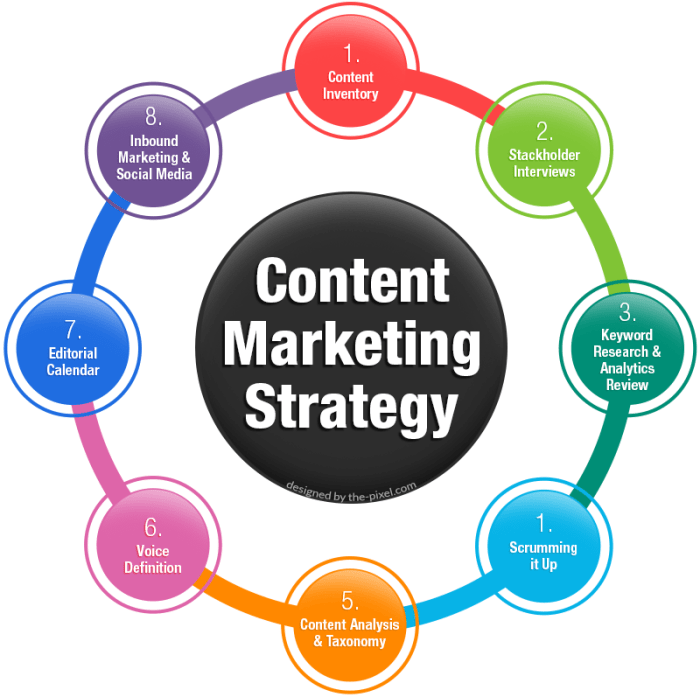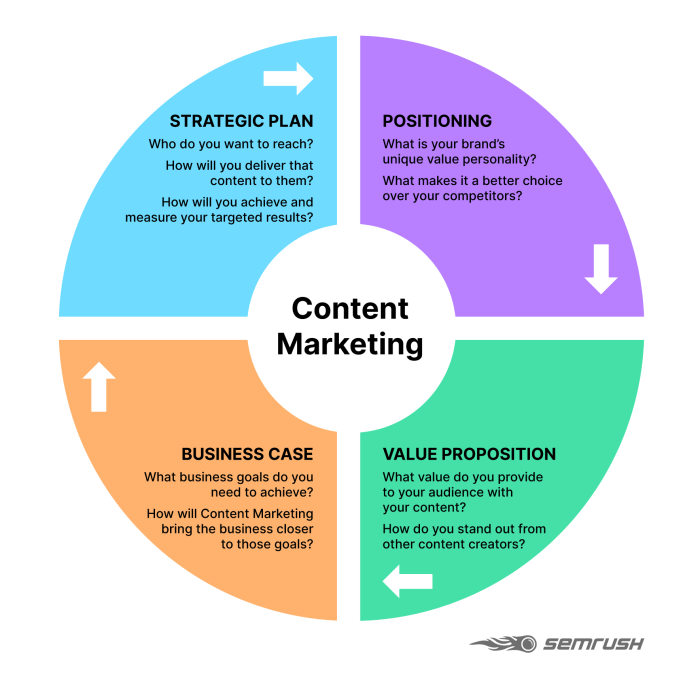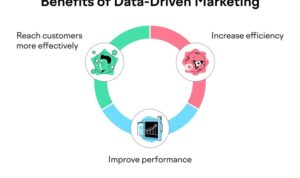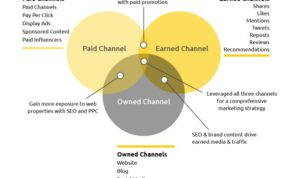Content Marketing Strategy takes center stage, inviting readers into a world of strategic planning and creativity. Get ready to dive deep into the realm of successful marketing tactics and engaging content.
In this guide, we will explore the key components, development process, measurement of success, and FAQs surrounding Content Marketing Strategy.
Introduction to Content Marketing Strategy
Content marketing strategy is a strategic approach focused on creating and distributing valuable, relevant, and consistent content to attract and retain a target audience. It involves planning, creating, and sharing content to engage with potential customers and drive profitable customer action.
Examples of Successful Content Marketing Strategies, Content Marketing Strategy
- Red Bull: Known for their extreme sports events and content related to adventure and energy.
- Dove: Embraced the “Real Beauty” campaign, promoting self-confidence and body positivity.
- GoPro: Utilizes user-generated content to showcase the capabilities of their cameras in action.
Importance of Having a Well-Defined Content Marketing Strategy
Having a well-defined content marketing strategy is crucial for several reasons:
- Establishing brand authority and credibility in the industry.
- Increasing brand awareness and visibility among the target audience.
- Building and nurturing relationships with customers through valuable content.
- Driving organic traffic to the website and improving rankings.
Components of an Effective Content Marketing Strategy

When it comes to crafting a successful content marketing strategy, several key components play a crucial role in driving engagement, brand awareness, and ultimately conversions. Let’s delve into the essential elements that make up a robust content marketing strategy.
Target Audience Analysis
Target audience analysis is the cornerstone of any effective content marketing strategy. By thoroughly understanding your target audience’s demographics, interests, pain points, and preferences, you can create content that resonates with them on a deeper level. This analysis helps in tailoring your messaging, tone, and content format to meet the specific needs of your audience, thereby increasing the likelihood of engagement and conversion.
Content Distribution Channels
Selecting the right content distribution channels is another critical component of a successful content marketing strategy. Whether it’s social media platforms, email newsletters, blogs, or third-party websites, the choice of distribution channels can significantly impact the reach and visibility of your content. By strategically leveraging various channels based on your target audience’s preferences and behavior, you can maximize the exposure of your content and drive traffic back to your website or landing pages.
Developing a Content Marketing Strategy
Creating a successful content marketing strategy involves several key steps that are crucial for achieving your business objectives. From defining your target audience to measuring your results, each step plays a significant role in the overall success of your content marketing efforts.
Setting SMART Goals in Content Marketing Strategy
When setting goals for your content marketing strategy, it’s essential to follow the SMART criteria to ensure they are Specific, Measurable, Achievable, Relevant, and Time-bound. Here are some tips to help you set SMART goals effectively:
- Specific: Clearly define what you want to achieve with your content marketing efforts. Avoid vague goals and be as precise as possible.
- Measurable: Set goals that can be quantified so you can track your progress and determine the success of your strategy.
- Achievable: Make sure your goals are realistic and within reach based on your resources, capabilities, and timeline.
- Relevant: Align your goals with your overall business objectives to ensure that your content marketing efforts contribute to the growth and success of your business.
- Time-bound: Set a deadline for achieving your goals to create a sense of urgency and focus on timely execution.
Aligning Content Marketing Strategy with Business Objectives
To align your content marketing strategy with your overall business objectives, consider the following tips:
- Understand your business goals: Clearly define your business objectives and how your content marketing strategy can support them.
- Identify target audience: Determine who your target audience is and tailor your content to meet their needs and preferences.
- Create relevant content: Develop content that aligns with your business goals and resonates with your target audience to drive engagement and conversions.
- Measure and analyze results: Monitor the performance of your content marketing efforts regularly and adjust your strategy as needed to ensure alignment with your business objectives.
Measuring the Success of a Content Marketing Strategy

In order to determine the effectiveness of a content marketing strategy, it is crucial to track key performance indicators (KPIs) that provide insight into the performance and impact of the content. By analyzing these KPIs, marketers can make informed decisions on how to optimize their content marketing efforts for better results.
Key Performance Indicators (KPIs)
- Website Traffic: Monitoring the number of visitors to your website can indicate the reach and engagement of your content.
- Conversion Rate: Tracking the percentage of visitors who take a desired action, such as signing up for a newsletter or making a purchase, helps measure the effectiveness of the content in driving conversions.
- Social Media Engagement: Analyzing likes, shares, comments, and other interactions on social media platforms can provide insights into the audience’s engagement with the content.
- Performance: Monitoring rankings, organic traffic, and backlinks can help assess the content’s visibility and impact on search engine results.
Tools and Methods for Tracking and Analyzing Content Marketing Performance
- Google Analytics: A powerful tool for tracking website traffic, user behavior, and conversions, providing valuable insights into content performance.
- Social Media Analytics: Platforms like Facebook Insights, Twitter Analytics, and LinkedIn Analytics offer data on engagement metrics to evaluate the performance of social media content.
- Tools: Tools like SEMrush, Moz, and Ahrefs help analyze performance, backlink profiles, and overall health to optimize content for search engines.
Importance of Continuous Monitoring and Optimization
Continuous monitoring and optimization are essential in content marketing strategies to ensure ongoing success and effectiveness. By regularly analyzing KPIs, identifying trends, and making data-driven decisions, marketers can adapt their content strategies to meet changing audience preferences and market dynamics. Optimization allows for fine-tuning content to maximize results and achieve the desired goals, ultimately driving better performance and ROI.





